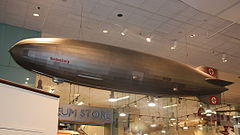The Hindenburg
| Movie | |
|---|---|
| German title | The Hindenburg |
| Original title | The Hindenburg |
| Country of production | United States |
| original language | English |
| Publishing year | 1975 |
| length | 125 minutes |
| Age rating | FSK 12 |
| Rod | |
| Director | Robert Wise |
| script |
Nelson Gidding , Richard A. Levinson (story), William Link (story) |
| production | Robert Wise |
| music | David Shire |
| camera | Robert Surtees |
| cut | Donn Cambern |
| occupation | |
The Hindenburg is a catastrophe film produced and directed by Robert Wise from 1975 , which is about the last voyage and the destruction of the German airship LZ 129 "Hindenburg" in 1937. In favor of tension, a fictional story is told based on speculations about an attack on the airship. The basis for the script was primarily the book Hindenburg. The last flight of LZ 129 (original title: The Hindenburg ) by Michael M. Mooney .
action
Warned by threats and in order to check the rumor that a saboteur could hinder the airship Hindenburg's journey to America and destroy this important symbol of the Third Reich, the Gestapo commissioned Colonel Franz Ritter to monitor the security of the airship and at the same time smuggled in an agent the passengers.
Much seems suspicious, and in the course of an investigation, a crew member Franz Ritter confesses that he has hidden a bomb on board that is supposed to explode after landing. Ritter, who himself is by no means satisfied with the policies of the Nazi regime, is undecided and tries to buy time.
Shortly before landing in Lakehurst , New Jersey , he decides to resist. The bomb is supposed to explode 90 minutes after landing. But the landing is delayed. Franz Ritter is still trying to avert the catastrophe, but too late. He and 35 others die in the flames.
production
Some scenes are based on real occurrences of the zeppelin, which however did not take place on the last trip of the zeppelin. The film describes a situation in which the covering of the airship tears and is repaired at great risk for some crew members. An underlying incident occurred on October 13, 1928 on the airship LZ 127 "Graf Zeppelin" during its first North Atlantic voyage. Even the Blüthner - wing , which is shown in the film, was with the trips in 1937 is no longer on board.
Evidence of an attack on the Hindenburg has not yet been found, there is only speculation about what happened. Electrical voltages may have ignited the new paintwork on the outside wall, or a bomb was smuggled on board.
The film gets by with just one model. The exterior shots of the Zeppelin consist largely of matte paintings by the specialist Albert Whitlock . This work won an Oscar in 1976 for best special effects. The seven-meter-long model from the film can be seen today at the National Air & Space Museum in Washington, DC.
The fact that the film is not so strict about facts is demonstrated by the fact that one of the passengers is traveling to America because of the upcoming takeover of Opel by General Motors ; because Opel was taken over by GM in 1929.
Cast and German voice actors
publication
Cinema and television
The world premiere of the film was on December 25, 1975 (USA), the German premiere on April 16, 1976 and the first showing of the uncut version in Germany on August 13, 1995 as a TV broadcast on West 3 . The grammatical correctness of the German title is disputed. The Zeppelin company also used the male form of the name " Der Hindenburg" in contemporary publications .
Home theater publications
- The Hindenburg . Piccolo Film / Universal Eight - 1979 - Super8, English, German, Spanish, Portuguese
- The Hindenburg . Universal Studios 1998 - US DVD, English
- The Hindenburg . Universal Studios 2007 - German DVD, 2.0 mono, German subtitles
- The Hindenburg . Universal Studios 2015 - German DVD, Dolby Digital 2.0, German subtitles
- The Hindenburg . Universal Studios 2015 - German Blu-ray, DTS-HD 2.0, German subtitles
Soundtrack
- David Shire : The Hindenburg. Original motion picture soundtrack . Intrada - digitally revised original recording of the film music under the direction of the composer
Awards and nominations
In addition to the Oscar for the best special effects, the Hindenburg received four other nominations: for the production design , the camera , the sound and the sound effects, for which Peter Berkos received the second Oscar.
Reviews
- "A catastrophe film that is routinely staged with great effort, which, while incorporating time-arrested fates, makes the accident, which has not yet been clarified, appear as a result of an anti-Nazi act of sabotage and throws a current spotlight on the importance of a highly developed technology within ideology and political counter-struggle." - Lexicon of the international Films
- “[...] carefully staged, semi-documentary reconstruction of the never-cleared-up event of impressive technical brilliance; Incorporated in melodramatic Hollywood fashion is the rumor of anti-Nazi sabotage. ”(Rating: 3 stars = very good) - Adolf Heinzlmeier and Berndt Schulz in Lexicon Films on TV (extended new edition). Rasch and Röhring, Hamburg 1990, ISBN 3-89136-392-3 , p. 367
Web links
- The Hindenburg in the Internet Movie Database (English)
- Further sound carriers with the film music at Soundtrack-Collector
- Comparison of the cuts from the old version to the Director's Cut from Die Hindenburg at Schnittberichte.com
Individual evidence
- ↑ The Hindenburg. In: Lexicon of International Films . Film service , accessed March 2, 2017 .

